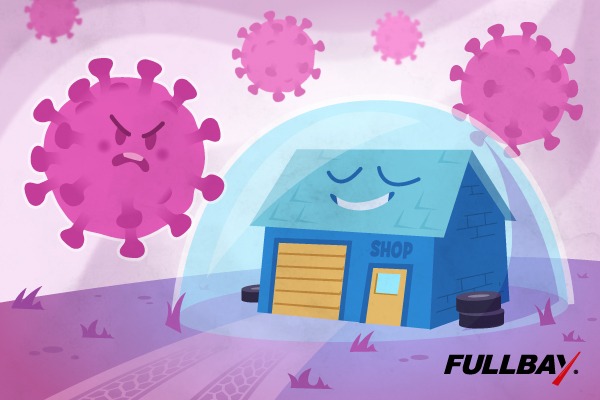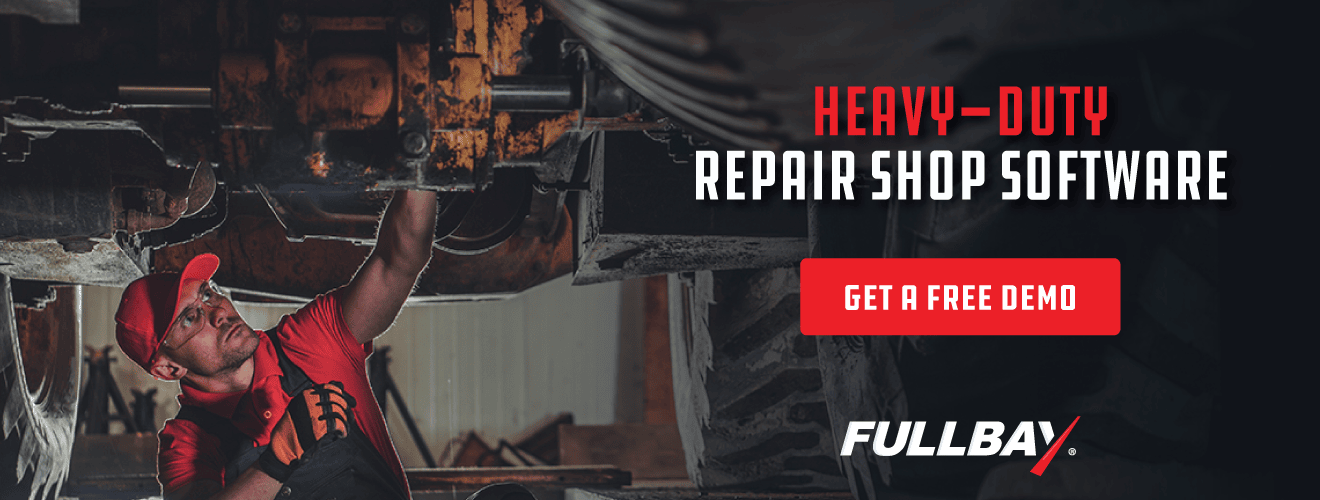Repair Shops Who Are Facing Challenging Times

We’re living in a strange new world.
There, we said it.
Coronavirus has been at the forefront of just about everyone’s mind. Everyone knows someone who’s affected by it; perhaps directly, through infection, or due to its impact on the economy. Over the last few weeks, the vast majority of us have watched the entire world change in an effort to adjust to our new normal.

Here at Fullbay, we’re fortunate to have an interesting view of what’s going on. We serve repair shops, which are critical to maintaining the trucks that keep food and supplies moving even during an economic slowdown. We’ve been keeping an eye on our clients, asking how they’re doing and what we can do to help.
The responses we got encouraged us to conduct some official interviews. We wanted to know how repair shops were really faring in all this, what they were doing to protect themselves, and what advice they’d offer to others.
Here are some of the takeaways.
Yes, Shops Take Safety Precautions – Lots Of Them!
We’ve all read about washing our hands, disinfecting groceries, and staying six feet away from each other. But is that happening in repair shops? Can it?
Yes, it can. Many shops have limited how many bodies can physically be in a location at a time, and this limitation applies to customers and staff. In some cases, they’ve staggered hours or changed operating days so there are few enough people indoors to maintain appropriate social distancing measures. Some have limited how many walk-in customers they receive, or, as Jennifer Callaway of Inland Empire Fleet Maintenance says, “[they aren’t taking] walk-in customers” at all – if you need service, you need to call ahead.
And yes, they’re also doing a lot of cleaning. Sanitize is the word of the day at most of these shops. They’ve stocked up on Lysol wipes and are washing their hands constantly. Jim Bethune of Abar Onsite reports that they sanitize every morning and afternoon, going after door handles in particular. Customers and techs alike are washing and sanitizing their hands as soon as they arrive.
One of the trickiest aspects shop owners face (besides keeping their staff healthy) is adapting to the protocols of other businesses. Shops don’t run in a vacuum; if they don’t have a part you need, for example, they’ll have to go to a supplier to get it. Everyone that’s still open has their own take on staying safe, and if your local repair shop needs to go to their parts store, they may have to take some extra steps and wait a little longer to get the necessary part.
Basically, everyone’s learning to be more flexible.
There’s Still Plenty Of Work
Once we learned about safety protocols, we turned our attention to the work itself, and how much work these shops were getting.
The good news is that there is still work – but the type of work these shops are getting has shifted. A lowered (or even potentially lowered) income means a lot of smaller fleets are being more careful about where they spend their dollars. If a customer has a truck with a diesel injector problem, the customer is likely to let that truck sit because they aren’t willing to fork over the five grand to repair it. “Some customers are spacing out repairs and stretching money out,” Jennifer says.
That does lead to a downshift in immediate appointments. Braedon Nidd of Adrenaline Diesel remarks that his shop used to see bookings at least three weeks ahead; now they are booking a week ahead, if that. Jennifer remarks that “Now [techs] are only working three days a week” instead of the usual five.
The important thing is, the work keeps coming.
“We are still here,” says Jim. Both Abar Onsite and Inland Empire Fleet have seen a lot of DOT inspections since the crisis began. “Not sure if it’s because they are on the road and getting inspected,” Jim says, “but we want to keep them running.”
Braedan from Adrenaline also indicated the repairs his shop is seeing tend to be critical fixes that need to be completed now: the stressful one-off traffic repairs. “People are scrapping the PM and trying … to get the trucks on the road now to provide supplies like toilet paper.”
Keeping Essential Workers Healthy
In most states, mechanics of all stripes are deemed essential workers. That’s good news for the supply chain; as long as techs can work, they can repair the trucks that are bringing supplies to those who need them.
Of course, that leaves techs with a couple of potential problems: One, heightened potential for exposure to COVID-19, and two, the potential to be confronted over whether they’re essential workers.
Jim from Abar drafted up a letter for his employees to show law enforcement if they were stopped. The letter provides a brief explanation of the employee’s job duties and assures anyone reading it that they are indeed essential.
The shops we talked to were all stocked up on gloves and masks already (N95 masks are used during grinding, so many repair places have those already). Jennifer from Inland Empire noted that she makes sure employees are wearing gloves before touching any steering wheels.
As we mentioned above, many shops are implementing social distancing and taking other precautions. In some cases, these efforts go online; they’ve used their websites or social media to post new rules for existing and potential customers to review before coming in. Some shops have asked customers not to come in if they are:
- Showing any kind of symptoms
- Have suspected contact with someone who has COVID-19
- Have traveled to areas with known outbreaks (e.g. New York City)
Additional regulations include customers being required to stay in their vehicles instead of coming into the shop, as well as an end to walk-in traffic.
But what if someone does get sick? What then?
All three shops were quite strict when it came to actually dealing with illness in the workplace: If you’re ill, stay home.
“You aren’t going to get better if you are working,” Jennifer says.
Braeden from Adrenaline did get sick and eventually tested positive for COVID-19. He stayed home for two weeks, recovered and was eventually cleared, and then took an additional week off after that.
Stay Hopeful
The shops we talked to all sounded remarkably composed and ready to face the challenges ahead. But just like the rest of us, they wish things were different and worry about the future. They hope a vaccine turns up sooner rather than later.
In the meantime, they work on what they can.
They’ve all acknowledged that we’re living in extraordinary times. “You have to realize it’s not ‘business as usual,’” Jim says. Shops are facing unique difficulties – but so are customers. So are the customers of your customers, if they have them. So are their families.
We’ve used the term “unprecedented” before, and we’re sure it will crop up again. These are unprecedented times. But the shop owners we talked to, while worried, were still full of hope.
We asked them to provide some parting words to other shops.
“The last thing you need is to run around worrying about everything,” Jim says. “Just try to keep things as normal as you can.”
Trucks are central to keeping commerce moving. Everyone needs trucks. Everyone. “Publicly distance and follow protocols,” Jennifer says. “Do the best you can to protect your employees and the public.”
You’ve seen stories of skyrocketing prices for sanitizing equipment and toilet paper. Repair shops could follow that same route, gouging customers because hey, trucks need to be on the road and people will pay to keep them there. Instead, Braeden suggests offering discounts to give back to the community and help out those who need it. “Reach out to as many people as you can,” he says, and even suggests checking in with dealers every week to see how things are going and if they need anything.
Parting Thoughts
We hesitate to call anything related to COVID-19 as having a silver lining, but there is one thing we came away from after talking to shops and just seeing people reaching out to each other: no one is alone. This is not an illness or situation that is only striking one group or one industry. It’s affecting the entire world.
Our founder and CEO, Jacob Findlay said it: We’re all in this together.
And we are.
Everyone is facing this. So let’s be there for each other, and come out of it stronger and better than we were.
“Everyone has their hands full,” Jim says. “So just let your customers know, ‘We are here and we’ve gotcha.’”

